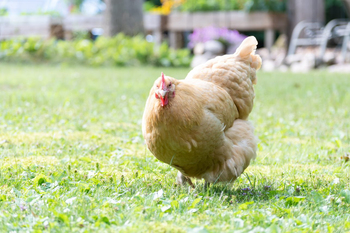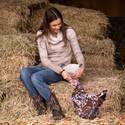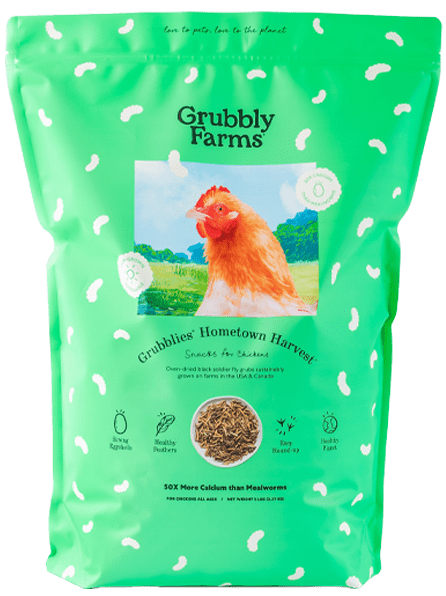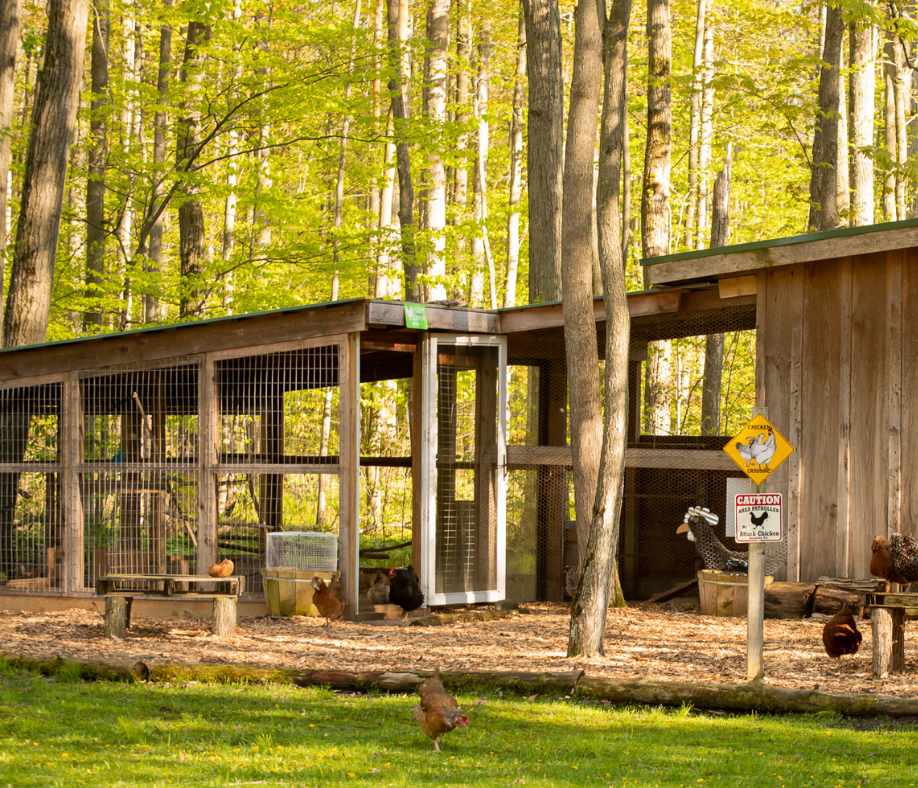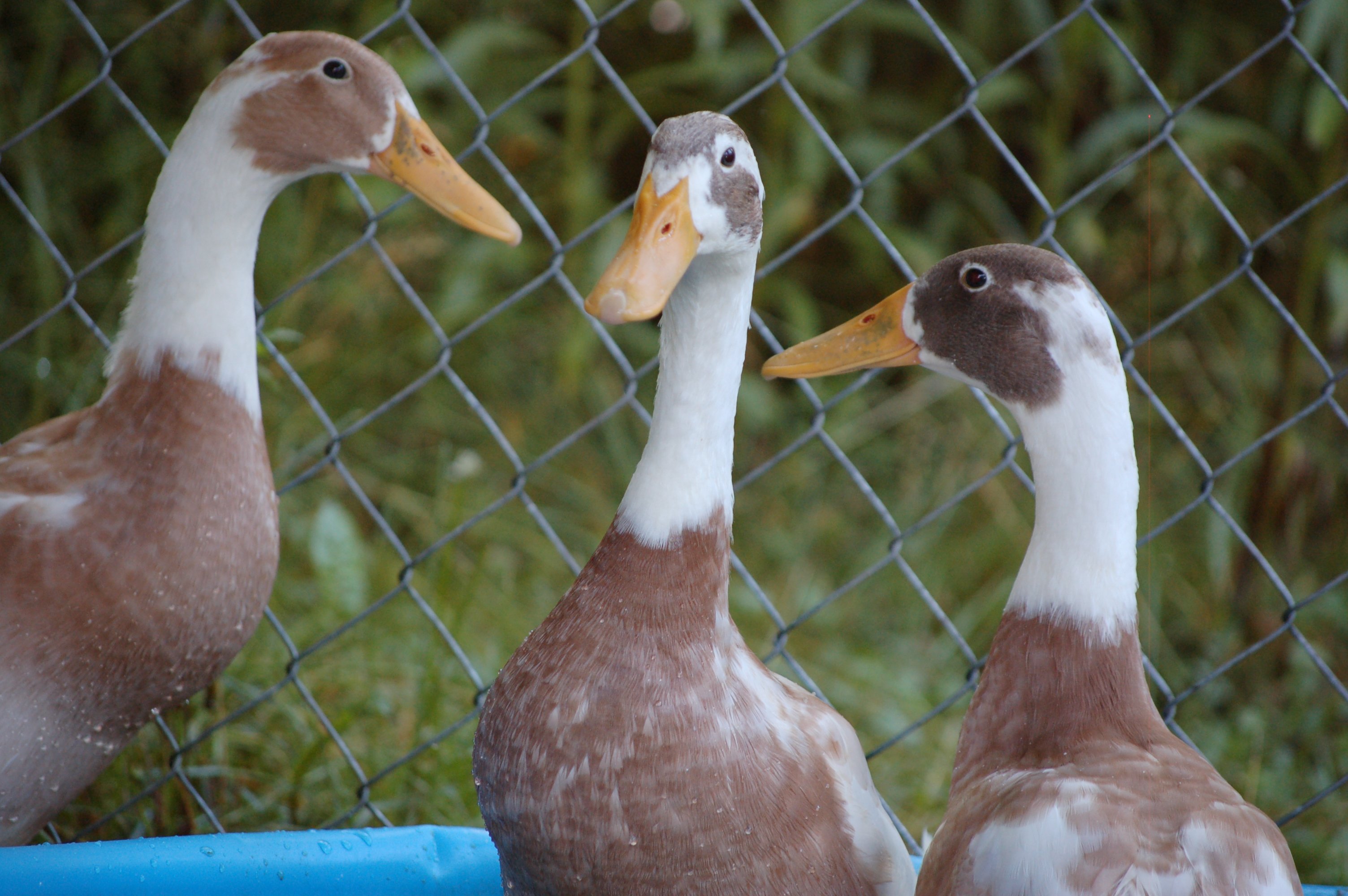More and more people are opting to raise chickens in their backyards. In fact, raising chickens in your suburban backyard is really no different than raising a flock on a country farm or sprawling homestead. However, there are a few caveats to owning a backyard flock–two of the biggest being limited space and possible code-related restrictions.
But if you’re considering getting chickens in the city, don’t give up before diving into the details. Chickens can be a valuable addition to your neighborhood as they are entertaining to watch, beautiful yard decor, and of course, provide you with those delicious, fresh eggs!
Can you have chickens in the suburbs?
The first thing you should consider when wanting to start a flock in your suburban backyard is if you’re allowed to do so. This is as easy as checking to see what city ordinances apply to raising chickens in your area.
To do so, simply Google, “domestic chicken codes your city.’

This will get you started on what steps you’ll need to complete before starting your suburban flock. We also recommend searching your county or parish regulations just in case.
Understanding Local Chicken Codes and Where to Go from There
Unfortunately, some suburbs don’t allow chickens at all while others simply have some restrictions you must follow.
What to do if Your City Doesn’t Allow Backyard Chickens
If your city has a no-go policy on chickens, you can always volunteer at a farm rescue to get your fill of feathered fun. And keep in mind that more and more cities are allowing residents to keep chickens. New York City even allows domestic chickens. So, check back from time to time regarding your city’s codes and advocate for chicken ownership in your area should the issue arise in town hall meetings or come up for a vote.
The Next Steps if Your City Allows Suburban Flocks
After verifying that you are allowed to have chickens in your suburban neighborhood, you should check with your local zoning authority for more details. They should outline the rules and regulations that apply to raising chickens in your area or point you in the right direction for who to contact.
Here is an example of how Nashville outlines some of their chicken regulations:

Apply for a Backyard Flock Permit
You will need to find out if any permits are needed or if any fees apply. You may have to pay an annual fee in order to keep chickens in your backyard and you may even need a residential backyard chicken permit. A building permit may also be necessary in order to have a chicken coop in your backyard.
You should also find out if there are any restrictions on flock size, gender, or chicken coop location. Some suburbs will not allow roosters, so you are only allowed to keep a flock of hens. You may also be restricted on how many birds you can keep, with restrictions being as small as a 2-bird flock.
As a prime example, here’s a snippet of the permitting process and requirements for domestic hens in suburban Nashville:


How to Raise Chickens in the Suburbs
After you commit to raising chickens in the suburbs, you need to take into consideration how you will go about raising a flock in your backyard. Chickens are truly adaptable animals, but they do need space and proper care in order to stay healthy and content.
The following 6 tips can help you keep your flock happy in their suburban home!
#1. Plan for a Proper Chicken Coop

Your suburban backyard flock will need a chicken coop that is both attractive and functional.
In most cases, having a chicken coop that both looks nice and meets the needs of your flock can keep the county officials, your flock, and your neighbors happy. There are some important things to consider when having a chicken coop in your suburban backyard:
- Cleanliness: Cleanliness is important for any chicken coop, but keeping the suburban chicken coop hygienic and odor-free is especially important for the health of your flock and the happiness of your neighbors (nobody likes smelling a stinky chicken coop).
- Manage Chicken Poop: Keeping the chicken coop clean is one thing, what to do with the droppings you remove from the coop is another! Composting the droppings is a great way to get rid of the droppings (along with any dirty coop litter) and turn them into something useful.
- A Bigger Run is Better: Have as big a run as possible attached to the chicken coop in case free-ranging your flock is not possible. Plenty of outdoor space will keep your flock healthy and stress-free.
- Predator Proof: Like any good chicken coop, the suburban chicken coop should also be predator-proof to keep your flock safe from backyard invaders.
Coop Location
One big factor to consider is the location of the chicken coop. In addition to making sure you consider regulations and proximity to other buildings and boundary lines, you will also want to make sure the chicken coop is in a shaded location so that it stays cool during the summer.
Choosing the Right Coop Bedding
The litter in the chicken coop should help keep the coop clean and odorless. It helps to choose a litter that composts well too. Composting both the chicken droppings and dirty litter can be an easy way to manage chicken waste in the suburban backyard.
#2. Determining Flock Size

The size of your chicken coop will be directly related to the size of your suburban backyard flock. Keeping the correct flock size for your backyard will make it easier to keep the chicken coop and run clean as well.
First and foremost, you should follow any regulations that limit how many chickens you can keep in your backyard–but keep in mind sometimes your city’s minimum size requirements can be less-than-ideal, and you may want to plan for more space per chicken.
Aside from regulations, you should also consider how many chickens your suburban backyard can sustain. Chickens need plenty of space to stay healthy and happy. Overcrowding your backyard flock can lead to bad behaviors, stress, and health issues.
General space requirements for backyard chickens
The size of the chicken coop you can keep in your suburban backyard may limit your flock size.
- Chicken Coop: 3 to 4 square feet coop space per standard size chicken
- Run: 12 to 15 square feet run space per standard size chicken
If your flock has to be confined most of the time, having a large enough chicken coop and a spacious run is imperative. Give your flock as much space as possible and keep your flock size at a reasonable number for the size of your coop and backyard.
Finding the Right Hen-Rooster Balance
However, if you are allowed to have a rooster in your flock, you will want to take extra precautions to ensure he isn’t annoying to your neighbors or a cause for complaining in your neighborhood. Make sure you have the correct number of hens for him and choose a breed that is known to be quiet.
How to Handle a Rooster in a No-Rooster Zone
When planning your flock size, keep in mind that many cities don't allow roosters. If this is the case in your area, buy sexed chicks. While sexing is only 90% accurate, you will wind up with far fewer roosters to rehome.
You will want to have a plan in case you do accidentally end up with a rooster in your flock. Make some connections outside your suburb or city. This will allow you to possibly rehome any roosters you accidentally end up with.
#3. Plan for Predators

A predator-proof coop and run is important for the safety of your flock. It helps to know what predators are in your area so you can take the right precautions.
Here are some common poultry predators that may have an impact on the suburban backyard flock:
- Raccoons, Rats, & Opossums will eat eggs and chicken feed, and may go after young or weak chickens
- Snakes will eat eggs and occasionally young chicks
- Foxes & Coyotes will go after chickens
- Stray Dogs will go after chickens to harass or kill
Protecting Your Suburban Flock
The first steps to keeping your backyard flock safe are installing locks on the coop door and ensuring your flock has access to their coop at all times of the day for protection.
Once your chickens are old enough, supervise any free-range time you give them. Your presence can help deter some predators.
Keep your chicken feed stored away from the chicken coop to further remove any enticement for a predator to enter the coop.
Make sure the fencing you use is sturdy and strong–many flock owners opt for hardware cloth). Also, check that the latches on the run are sufficiently predator-proof (use a two-step method for unlatching), Finally, ensure that coop windows are secured with latches and that vents have secure hardware cloth that a raccoon cannot pull off.
An Often-Overlooked Danger
One ‘predator’ that is not so much a predator as a danger to the suburban backyard flock is other people. As sad as it sounds, sometimes backyard flocks can be the target of harassment or even stealing.
If there are people who don’t approve of your flock (even though you follow all of the regulations), they may be prone to unnecessarily call codes to give you a hard time and try to get you in trouble. One way many people in the ‘burbs maintain healthy relationships with their neighbors is with gift eggs. Another is to keep communication open (see Tip #6 for more information).
#4. Free-Ranging in the ‘Burbs

Being able to free-range your suburban flock is a great way to keep them happy, healthy, and stimulated in your backyard. There are several things to consider if you want to free-range your flock in your suburban backyard:
- Space: Make sure you have enough backyard space to let your flock free-range without damaging your grass or yard. Over time, your flock will turn lush, green grass into barren ground.
- Gardens: If you don’t want your gardens destroyed (or your neighbor's garden), make sure they are fenced off, this includes flower beds and flower pots. Don’t worry–chickens and gardens can co-exist in harmony.
- Fencing: It is very helpful to have your backyard fenced in to keep your flock from wandering outside of your property boundaries
- Chicken Poop: Be aware that you will have chicken poop in your backyard (and on any walkways) if you let your flock free-range.
The Benefits of Free-Ranging for Suburban Birds
Allowing your flock some supervised free-range time each day or as often as possible can benefit their health! Free-ranging gives your flock a chance to stretch their legs and participate in instinctual behaviors such as foraging for food and dust bathing. Your free-range flock can even benefit your yard by providing fertilizer (chicken poop) and pest or weed control.
If you can’t free-range your flock, you will want to make sure they have as much space as possible in their enclosed run. Keep them active and stimulated by providing enrichment and interactive toys in their run. Make sure you provide them with a place to dust bath and plenty of fun perching options.
#5. Accounting for Chicken Noise

Chickens make noise, which some people may find annoying or disturbing. This is one reason why some areas don’t allow roosters in the suburban backyard flock. However, even hens can get loud at times, such as when they sing their egg song before or after laying or when they are alarmed.
To keep chicken noise to a minimum and make for happy neighbors, choose chicken breeds that are known to be quieter. Some breeds naturally have a quiet disposition and are less likely to make loud noises or be alarmed.
A few chicken breeds that are known to be quiet include:
- Australorps
- Wyandotte
- Cochin
- Ameraucana
- Bielefelder
- Dominiques
- Faverolles
- Java
#6. Neighborhood Project

Lastly, it is always a good idea to communicate with your neighbors before you get chicks. Inform them about your desire to have a backyard flock and get their opinions on whether they approve, are tolerant, or are against the idea of having chickens in the neighborhood.
Always keep your coop clean and follow any city ordinances. As long as your flock fits naturally into their suburban setting, your neighbors may be more tolerant and appreciative of your backyard flock.
For neighbors that seem leery of your future feathered friends, proactively address their concerns. For example, you may want to let them know you’ve planned on keeping your coop and run in prime condition and with a reasonable distance from their property.
Win Them Over with Eggs, Compost, & Hands-On Education
Sometimes it helps to share the benefits of your backyard flock with your neighbors! Gift them farm-fresh eggs and invite them over to hold the cute baby chicks or visit with your beautiful, fun, and entertaining flock. This works magic on parents of children and most skeptics in general.
If you work on composting the chicken droppings, you could offer some nutrient-rich chicken poop compost to friends and neighbors with gardens.
Welcome Your Flock to the Suburbs

Suburban chickens can be happy and healthy while benefiting you and your neighbors! Raising chickens in suburban backyards is a great way to practice self-sufficiency, sustainability, and the many joys chickens have to offer! They can become a fun neighborhood project that benefits the community and are a great addition to your neighborhood.
Just make sure you always follow any regulations that pertain to keeping a suburban backyard flock and keep the coop clean and presentable to help your backyard flock fit into their suburban surroundings.





